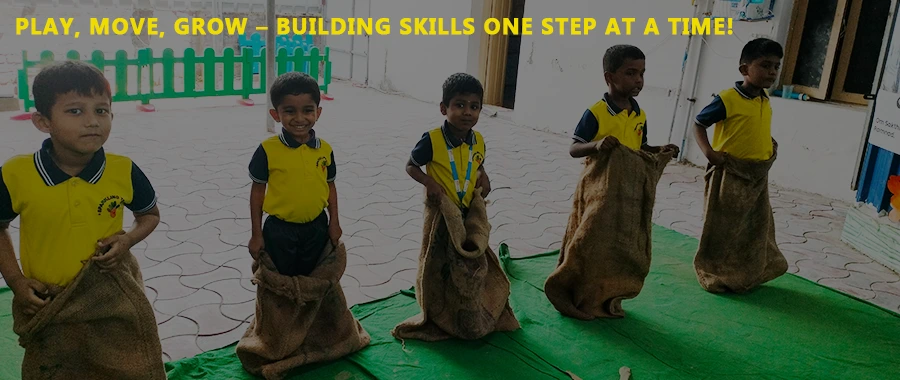Blog
Best gross motor movement games & Activities for kids

Engaging children in gross motor movement games and activities is vital for their physical development and overall well-being. Fun options like obstacle courses using pillows, hula hoops, cones, and tunnels help children crawl, jump, balance, and climb, boosting coordination and balance. Classic games such as Simon Says encourage large muscle movements through actions like jumping jacks, hopping, skipping, and stretching. A lively dance party is another great way to improve rhythm, balance, and coordination while letting kids express themselves freely. Activities like animal movements—bear crawls, frog jumps, crab walks, and bunny hops—enhance motor skills and spark imagination, keeping children both active and entertained.
Other engaging options include balloon volleyball, where kids hit a balloon over a net using various body parts to develop hand-eye coordination and motor skills. A scavenger hunt with running, jumping, and reaching elements adds adventure and physicality to playtime. Freeze dance encourages listening skills, balance, and body control, while relay races promote teamwork, coordination, and cardiovascular health through running, hopping, or skipping. Introducing simple yoga poses like downward dog, tree pose, and cobra pose enhances flexibility, strength, and body awareness. Finally, balancing games using a tape line or low beam challenge children to walk, hop, or tiptoe, strengthening balance and core stability in an enjoyable way.
"The path from dreams to success does exist. May you have the vision to find it, the courage to get on to it, and the perseverance to follow it."
Kalpana Chawla
Benefits
- Gross motor activities like jumping, climbing, and running are essential for improving children's physical strength, balance, and overall coordination. These movements build strong muscles and enhance body control, laying the groundwork for more complex physical tasks. Beyond the physical benefits, gross motor movement also boosts brain development by stimulating neural connections that support cognitive skills such as focus, memory, and spatial awareness.
- Regular physical activity encourages healthy growth and lifelong fitness habits. Movement-based play promotes cardiovascular health, flexibility, and the maintenance of a healthy body weight, setting the stage for an active lifestyle. In addition, children build confidence and independence as they master physical skills like hopping on one foot or riding a scooter—achievements that foster self-esteem and a sense of personal capability.
- Gross motor play also supports the development of important social skills. Group activities such as relay races and obstacle courses teach children how to take turns, follow instructions, and collaborate with peers. These experiences help children develop teamwork and communication skills in a fun, interactive environment. At the same time, physical play improves emotional well-being by allowing children to release energy, reduce stress, and manage their emotions more effectively, leading to better overall mood and self-regulation.
- Finally, strong gross motor skills directly impact school readiness. Children with developed physical coordination often exhibit better posture, focus, and endurance in classroom settings. These skills support fine motor development needed for tasks like writing, cutting, and using tools, while also enabling children to sit still, pay attention, and participate in classroom routines with greater ease and success.
Our tips
Incorporate physical play into your child’s daily routine—whether it’s a morning stretch, afternoon dance party, or an evening game of tag—to make movement a daily habit. Choose age-appropriate games that match your child’s developmental stage; younger kids may enjoy crawling tunnels or hopscotch, while older children can try relay races or balance games. Everyday items like pillows, masking tape, and chalk can be used creatively to set up obstacle courses, jumping paths, or outdoor games without the need for fancy equipment. Balance structured games like Simon Says with unstructured outdoor time to foster coordination, creativity, and confidence. Get involved as a family by joining in the fun, which strengthens your bond and reinforces that movement is both enjoyable and important. Encourage outdoor exploration—running on grass, climbing trees, and discovering parks all promote physical development and balance. Most importantly, celebrate progress over perfection by focusing on participation and praising your child’s efforts to boost motivation and self-esteem.